Why We Need Superheroes
Recently I spoke at a homeschooling convention on the question of why superheroes are so prevalent in our culture today.
Already this year the movie Black Panther has been a cultural phenomenon, as Wonder Woman was last year, and Avengers: Infinity War has broken multiple records in its first week of release.
How do we as Christians respond to this trend?

Jason Joyner, author of the forthcoming superhero novel Launch, explored superheroes in light of the gospel at the Texas Homeschool Convention this March.
First, we must ask: how did we get here?
Cultures throughout human history have had mythic heroes. Greek mythology may be the most recognizable, but from China to Native Americans to African tribes, myths have helped societies speak to things that are bigger than themselves.
Walter Wangerin Jr. said that myth is how we comprehend our own experience.
Author Don Richardson in his book Eternity In Their Hearts argues that cultures are primed for the gospel in different ways.
Ecclesiastes 3:11 states that, “He has also set eternity in the human heart.”
Paul the apostle takes advantage of this principle on Mars Hill in Athens when he speaks to the crowd from the altar for the unknown god there (Acts 17). He sees they recognize something they are missing, and he attempts to engage the crowd—not by preaching from Jewish law (his culture), but by speaking from creation (general revelation).
The idea of superheroes springs from our modern culture’s longing for transcendence out of our circumstances, and our intuitive sense that we need a savior. By recognizing this, we can use the idea of superheroes as a way to engage our culture.
C. S. Lewis talks about the idea of One True Myth. The Bible can be considered mythical, not in the “it isn’t true” sense, but in the idea that it deals with circumstances bigger than we can comprehend in human term:
“Now the story of Christ is simply a true myth: a myth working on us the same way as the others, but with this tremendous difference that it really happened: and one must be content to accept it in the same way, remembering that it is God’s myth where the others are men’s myths: i.e., the Pagan stories are God expressing Himself through the minds of poets, using such images as He found there, while Christianity is God expressing Himself through what we call ‘real things.’”
If the Bible and the stories within rise to this level of being “mythic”—speaking beyond human understanding, then superhero stories can be seen in a similar vein. In an uncertain world, it’s natural to look for hope in the stories we tell.
It’s not an unnatural relation between Christianity and superheroes. All we need to do is look at the Bible for miracles and heroic (and sometimes anti-heroic) characters. Moses parting the sea. Samson’s great strength. David and Goliath, or David’s mighty men from 2 Samuel 23. Nowadays we would call these folks superheroes.
Comic book creators have been making these connections for years. In Man of Steel, when Clark Kent heard the ultimatum from General Zod to surrender, he goes to a church to talk with a priest. Look at the photos and the placement of Jesus in Gethsemane. Director Zack Snyder knew what he was doing with this.
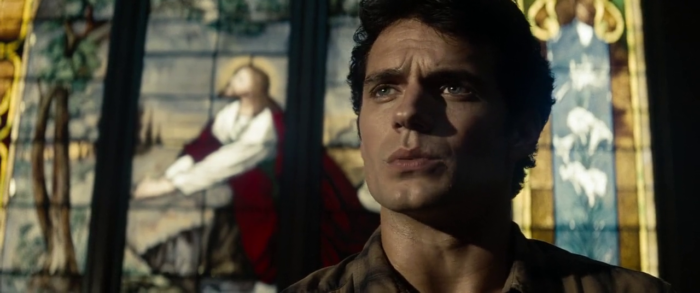
In Spider-Man 2, when Spider-Man stops the train, he is rescued by the passengers when he passes out from the strain. The following pictures show how director Sam Raimi echoes the stations of the cross as Spidey is brought in from the train.1
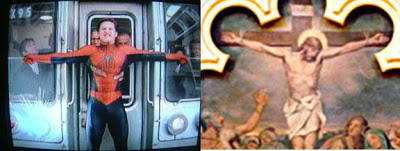
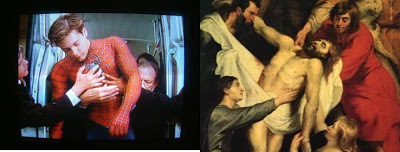
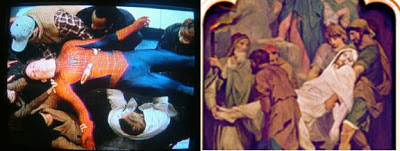
Certainly, there are unpleasant aspects of comic book culture, from hypersexuality of the costumes, to outlandish violence, to crude situations like Deadpool. We cannot fully take on any popular culture aspect without discernment.
But when we look at our current preoccupation with superheroes, what does that say about our culture subconsciously?
I would argue that heroes are so compelling because we need a hero. We realize, whether directly or subconsciously, that we cannot overcome all that we encounter on our own. Try as we might, we are not able to complete our own salvation. We may fight valiantly, but our struggle is ultimately doomed against the supreme villain.
In the end, this attraction to heroes points us to the one who fought evil without ever turning to temptation. He went toe-to-toe with our greatest foe on our behalf. He sacrificed himself in defending truth, justice, and mercy. And when all seemed lost, he rose in even greater power and strength for the ultimate victory.
Jesus is my hero.
Now we can look for those things that speak to the “eternity in their hearts” principle. We can be mindful of our culture, as Paul was, and look for those times to speak truth when the opportunity arises. Whether in relating to people in real life or in our stories, we can speak to the need for hope, the need for a savior. And point them to the greatest hero of all.
- Hat tip to Matt Mikalatos for pointing this out to me. ↩
































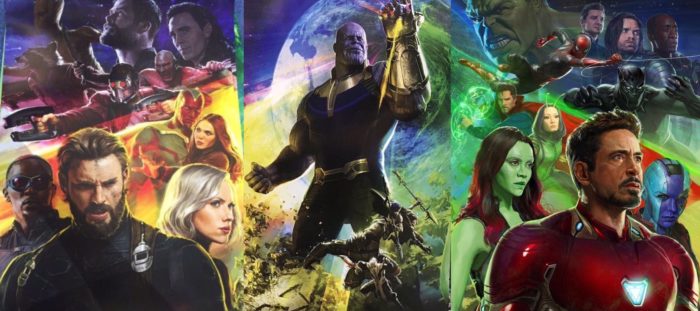
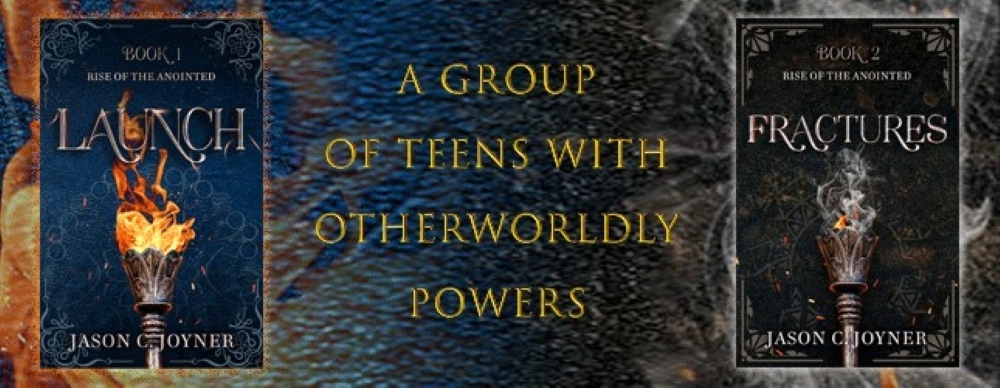








Wow, I love this, Jason! I love how superheroes can point us toward Jesus, and you expressed that so well. 🙂
Thanks Bethany! It was fun to wrestle with the ideas, and I really believe in the deep meaning behind John 15:13 and laying down one’s life as the greatest love.
I also appreciate Jason pointing out that superheroes can point towards Jesus. But I think “can” is an important word–I think superheroes also can and do function in our culture at times as a substitute for belief in the actual God. The desire for transcendence being satisfied by means of a substitution of the fictional for the real. Unfortunately.
Travis,
I missed this comment or I would have answered back. Certainly many things can take the place of God in our world. That’s why we need to be aware of things and speak to the truth.
Very cool insights, Jason! I love your reference to Spider-Man 2 with the train – the imagery seemed familiar to me as Christ-images, but I didn’t recognize them specifically.
I feel we also need heroes as examples, just as Moses and King David and others were, not replacing Christ but demonstrating how we can live our lives better, as those godly people did. I think modern superhero films have touched on the noble aspects of self-sacrifice that are required to become a hero and servant to the community, that being a hero starts in the mind & heart, and I believe that is what makes these new superhero films so compelling as teaching models for life. Whether we see those same ideals of courage, humility, hope, compassion represented in biblical heroes, sports heroes, political heroes, or fictional heroes, what matters is that we see the character traits we admire so we can strive to live them out in real life.
Exactly. We are encouraged by true heroism through many examples. I’m a believer that all truth is God’s truth. If a Buddhist story speaks of God’s truth, it’s true despite the vehicle.
This is a great article! You made some really good points here. Jesus is my hero too!
Thanks, Ryan. I hope it inspires you in your superhero stories.
Love this article, Jason.
I’m fond of saying that superheroes can serve as Christ-figures. But mainly they can serve as Christ-figure-figures or Christian-figures—images of Christ’s people as they themselves image Christ. Thus, the struggles of Kal-El versus the cynicism and politicization of his surrounding world in Man of Steel and especially Batman v Superman: Dawn of Justice. Thus, Spider-Man’s struggles to take responsibility for his great power, versus care for the ones he loves. And so on.
Yes. There’s a lot that can be drawn out from this subject. I just finished Iron Man 3, and the message that he realizes his identity isn’t in the shell he puts on, but who he is created to be, resonated out with me more than ever before.
I need to watch Infinity War several more times soon to fully dig into that. 😉
Thanks for creating this post. I have always been a big comic book fan since I was young. I have often noticed the rich symbolism and deeper theological truths that can be drawn out. I’ve used the analogy of specific superheroes and comic books in a number of talks and have made reference to them a number of times in my own posts.
It’s a great comparison of Spider-Man 2 and the imagery taken from classical paintings. I hadn’t noticed that before. I’m sure there are many other homages.
Robert,
Thanks for your thoughts. In my talk I went deeper into how we can be like Paul on Mars Hill and use facets of a culture to explain the gospel. There is a lot of symbolism and truths you can find and use as a bridge with others.